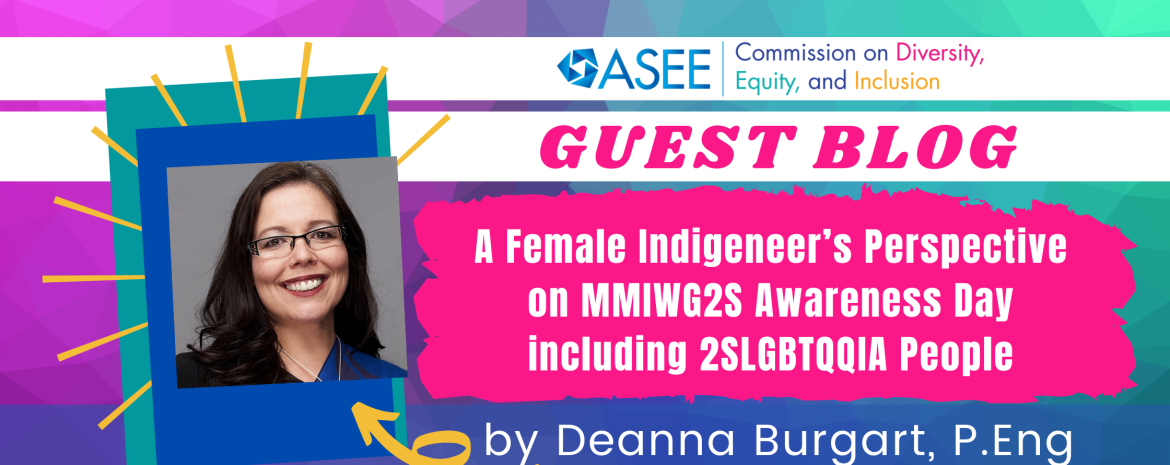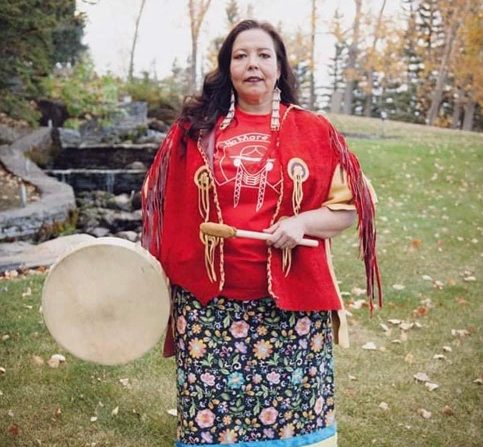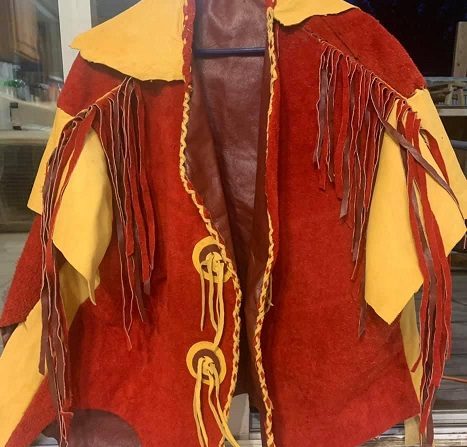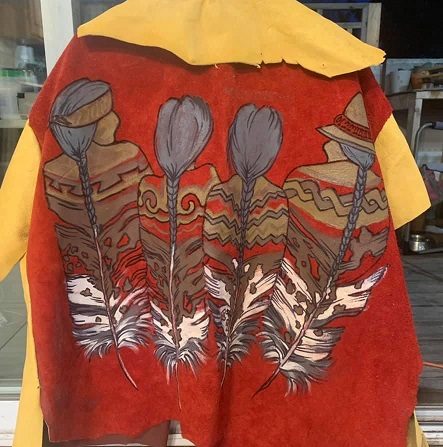A Female Indigeneer’s Perspective on MMIWG2S Awareness Day including 2SLGBTQQIA People
May 5, 2023, was the National Day of Action on Missing and Murdered Indigenous Women, Girls, Two-Spirit People including the LGBTQQIA people. As Teaching Chair focused on weaving Indigenous knowledge and perspectives into Engineering Education, it was important to me to write an acknowledgement of this day and its importance to me as an Engineer, an Educator, and an Indigenous Woman.
Decolonizing engineering spaces begins with awareness of our history as engineers, as members of society, and as human beings. For decades I, and many colleagues, have been passionate about gifting time and energy in the engineering profession towards furthering gender equity and creating safer spaces for all. I started my career in the 1990s and, as an abuse survivor, my daily existence has always been acutely aware of the need for action towards ending violence against women. In 1991, the Parliament of Canada established the National Day of Action and Remembrance on Violence Against Women in response to the 1989 Ecole Polytechnique Massacre. An act of violence by one man killing 14 engineering students and injuring 14 others on December 6, 1989, all in the name of “Fighting Feminism”. This day has been observed for over 20 years now in schools, engineering organizations and across the country. The deaths of 14 women annually remind us that we need to work together to collectively end violence against vulnerable people.
Historically, one group has borne the brunt of suffering when it comes to equity and safety, Indigenous women, girls, Two-Spirit and LGBTQQIA people. Walks, vigils, and ceremonies have taken place across across Turtle Island (Canada and the United States) at different times throughout the year for many decades to raise awareness of MMIW (Missing and Murdered Indigenous Women) (a.k.a MMIWG, MMIWG2S or MMIWR – relatives). These events have been organized as early as the 1990s by family members, leaders, Elders and community members passionate about lifting voices, speaking the names of those taken, and honouring their spirits. Relatives come together to call for action, change and the ongoing protection and valuing of women, girls and gender diverse people. Whenever I personally attend an event, I honour those lost, and pray for the thousands of families, relatives, sisters, mothers, fathers, aunties and uncles, many who will never really know what happened to their loved one. These women did not have a country and all it’s wealth and resources looking for them. They were dismissed by law enforcement, or ignored, often simply because their lives were seen as less than. In some cases, they lost their lives at the hands of law enforcement. They were not afforded the dignity of the same treatment they would have received had they been a non-Indigenous person.
In 2010, artist Jaime Black started the REDress project to represent the Indigenous women and girls that were missing, and the red dress was displayed in a museum in Winnipeg. May 5 was declared Red Dress Day which is now observed in Canada and the United States. Statistics Canada Reports that the rate of homicides for Aboriginal women and girls is almost seven times higher than that of other female victims.
Furthermore, the GSS on Social Identity indicates that about 2 in 10 Indigenous people (22%) reported having little or no confidence in police.
The GSS on Canadians’ Safety also found that in 2019 the prevalence of spousal violence was more than twice as high among Indigenous people (7.5%) as non-Indigenous (3.4%).
These figures echo the findings of the 2019 National Inquiry into Missing and Murdered Indigenous Women and Girls about the need to improve justice and equality under the law for Indigenous women and girls.
Awareness is part of the broader march toward reconciliation, and the visual reminder of these red dresses is an opportunity to remember and reflect on the pain and loss. (Red Dress Day, remembering loss, looking to justice, https://www.statcan.gc.ca/o1/en/plus/905-red-dress-day-remembering-loss-looking-justice, Retrieved May 4, 2023.
Although the first Red Dress Day commenced in 2010, there have been many annual marches, vigils, and ceremonies for Missing and Murdered Indigenous women in Canada and the US since as early as the 1980s.
For decades in Vancouver, the Indigenous community has come together for the Women’s Memorial March on February 14 to honour missing and murdered Indigenous women which my mother and her community and ministry worked to support. In Thunder Bay, Sharon Johnson founded the Valentines Day Memorial Walk in honour of her late sister who was found in 1992. Examples of thousands of missing and murdered Indigenous women and gender diverse peoples have led to hundreds of memorials and gatherings over the years, and their voices are now being heard and acknowledged by non-Indigenous Canada. This gives me hope.
From August 3, 2016 to June 30, 2019 thousands of community members came together in Canada for the National Inquiry into Missing and Murdered Indigenous Women and Girls. This inquiry heard the testimonies of 1484 Family Members and Survivors and involved 2386 community members, Knowledge Keepers and Elders. A report was published on June 3, 2019 and I would strongly encourage all Canadians to visit the website and read the report, the executive summary and the calls to action. Only when we come together as a people can we put a stop to this horrific reality.
When I first learned of these truths in 2007 attending university in Thunder Bay, I was shocked, devastated and enraged. I am a 60s scoop survivor and adoptee who came to reconnect with my Dene and Cree relatives later in life. Since then, listening to my friends, my mother, sisters, aunties and relatives share their stories of dehumanization, demoralization, violence, and murder left me feeling helpless, afraid, and deeply concerned for my own children. But movements like that which we are observing on May 5 also give me hope. Hope that the more awareness is raised through the tireless work of so many beautiful community members, the more all of Canada and Turtle Island will commit to a better tomorrow.
My late mother, Vivian Seegers, was very active in the community of Vancouver in raising awareness on this day, and throughout the year, with the hope and prayers of “No More Stolen Sisters”. Every year I honour her and her work in this space and pray for the guidance to carry on her work wherever I am called.
I am writing this article on May 4 because on May 5, I will be sharing the day in community, in ceremony, in prayer and in reflection. I will pray for the courage to stand up for my sisters and relatives, to speak out against violence; physical, emotional, spiritual or any combination thereof. I will pray for the clarity to see where my heart and spirit can be of service in continuing to raise awareness throughout the year. I will pray for the continued healing of our communities, our homes, our workplaces and our professions.
To those reading these facts for the first time, you may be wondering what you can do going forward to be a part of the solution. From the 231 Calls for Justice that came out of the MMIWG Inquiry, the following are calls to action for ALL Canadians. These would be a powerful, transformative place to start.
Calls on Everyone
As the Final Report has shown, and within every encounter, each person has a role to play in order to combat violence against Indigenous women, girls, and 2SLGBTQQIA people. Beyond those Calls aimed at governments or at specific industries or service providers, we encourage everyone to consider how they can give life to these Calls for Justice.
We call on everyone to:
- Denounce and speak out against violence against Indigenous women, girls, and 2SLGBTQQIA people.
- Decolonize by learning the true and indigenous history in your local area. Learn about and celebrate Indigenous Peoples’ history, cultures, pride, and diversity, acknowledging the land you live on and its importance to local Indigenous communities, both historically and today.
- Develop knowledge and read the Final Report. Listen to the truths shared, and acknowledge the burden of these human and Indigenous rights violations, and how they impact Indigenous women, girls, and 2SLGBTQQIA people today.
- Using what you have learned and some of the resources suggested, become a strong ally. Being a strong ally involves more than just tolerance; it means actively working to break down barriers and to support others in every relationship and encounter in which you participate.
- Confront and speak out against racism, sexism, ignorance, homophobia, and transphobia, and teach or encourage others to do the same, wherever it occurs: in your home, in your workplace, or in social settings.
- Protect, support, and promote the safety of women, girls, and 2SLGBTQQIA people by acknowledging and respecting the value of every person and every community, as well as the right of Indigenous women, girls, and 2SLGBTQQIA people to generate their own, self-determined solutions.
- Create time and space for relationships based on respect as human beings, supporting and embracing differences with kindness, love, and respect. Learn about Indigenous principles of relationship specific to those Nations or communities in your local area and work, and put them into practice in all of your relationships with Indigenous Peoples.
- Help hold all governments accountable, and in the case of Canada, hold the government accountable to act on the Calls for Justice.
(National Inquiry into Missing and Murdered Indigenous Women and Girls, https://www.mmiwg-ffada.ca/final-report/ retrieved May 4, 2023, Document Download Entitled Calls For Justice)
About Deanna Burgart P.Eng (she/her)
Deanna Burgart P.Eng is a Cree Dene Irish-Canadian Senior Instructor and Teaching Chair in the Schulich School of Engineering at the University of Calgary in Alberta, Canada. In addition to teaching courses on Technology and Society, Sustainability in Energy and Environmental Engineering, she is focused on weaving Indigenous knowledge and perspectives into engineering. She brings over 20 years of experience in oil and gas and pipelines and is passionate about the United Nations Sustainable Development Goals and United Nations Declaration of Rights of Indigenous People. She is also committed to helping STEM (Science, Technology, Engineering and Math) focused organizations and educators operationalize Indigenous inclusion in their work.
Deanna is a proud mother of 3 and Kokum (grandmother) of 1 and lives in Treaty 7 Territory where she resides with her husband Jonathan, her two youngest and their two Aussie Doodles, Schrödinger and Katya (Kat).
She can be found on social media:
Facebook https://www.facebook.com/Indigeneers
Twitter @Indigeneer
LinkedIn https://www.linkedin.com/in/indigeneer/
Instagram Deanna_burgart_Indigeneer
Do you want to become a guest blogger?
CDEI Guest Blog highlight future events, describe best practices, or share calls to action by CDEI members. We invite you to propose posts that share brief research highlights, reports of impactful initiatives, critical thought pieces, and resources you find useful. We especially encourage emerging scholars to share their work. If you are interested in sharing a blog or resource post, you may submit your proposal here. All posts are screened and edited.




